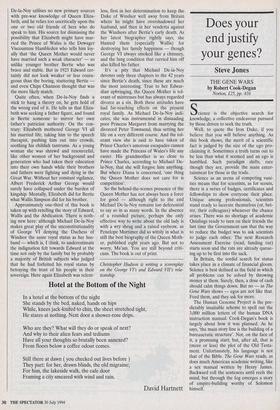Does your end justify your genes?
Steve Jones
THE GENE WARS by Robert Cook-Degan Norton, £25, pp. 416 Science is the objective search for knowledge, a collective endeavour pursued by those driven to seek the truth.
Well, to quote the Iron Duke, if you believe that you will believe anything. As this book shows, the merit of a scientific fact is judged by the size of the ego pro- claiming it. Sometimes a truth turns out to be less than what it seemed and an ego is humbled. Such paradigm shifts, rare though they are, provide the main enter- tainment for those in the trade.
Science as an arena of competing vani- ties means that for scientists, as for scouts, there is a series of badges, certificates and fellowships to show everyone their place. Unique among professionals, scientists stand ready to lacerate themselves (or, bet- ter, their colleagues) whenever the chance arises. There was no shortage of academic Quislings ready to turn on their friends the last time the Government saw that the way to reduce the budget was to ask scientists to judge each other. The next Research Assessment Exercise (read, funding cut) starts soon and the rats are already queue- ing up to be first into the sack.
In Britain, the sordid search for status takes place in a climate of financial gloom. Science is best defined as the field in which all problems can be solved by throwing money at them. Surely, then, a dose of cash should calm things down. But no — as The Gene Wars shows — egos are not like that. Feed them, and they ask for more.
The Human Genome Project is the pre- dictably insatiable scheme to spell out the 3,000 million letters of the human DNA instruction manual. Cook-Degan's book is largely about how it was planned. As he says, 'the main story line is the building of a bureaucratic structure'. Not, on the face of it, a promising start; but, after all, that is (more or less) the plot of the Old Testa- ment. Unfortunately, his language is not that of the Bible. The Gene Wars reads, as does much American academic writing, like a sex manual written by Henry James. Backward roll the sentences until reels the mind, but through the fog emerges a story of empire-building worthy of Solomon himself. The idea began in 1984 when Robert Sinsheimer, of the University of California at Santa Cruz, had an outrageous idea: to sequence the human genome at a time when a scheme to do the same to the DNA of a single bacterium had been abandoned as over-optimistic.
He was driven by a disinterested search for money. The legacy of a car importer was looking for a home to which its bene- factor's name could be attached. An attempt to fund a vast telescope was pre- empted by a bigger gift, and Sinsheimer saw the chance of attracting the name, the cash and the human genome to his own campus.
Santa Cruz was foiled by those with big- ger appetites. The National Institutes of Health fell into a dispute with the Depart- ment of Energy about who should pay. As the latter's job is nuclear technology this is, in the British context, rather like the Department of National Heritage putting in a bid to run the nation's schools (not, in these days, that much of a fantasy). But nuclear power stations make ingredients for bombs, bombs might cause mutations (although they did not in Hiroshima) and — it's obvious — the bomb-makers should control the project.
Both ended up paying. There was a fee- ble attempt to kill the scheme before any- one could fund it. As one disaffected biologist pointed out, our knowledge of space today would be far greater if the Space Shuttle had been strangled at birth: even a tenth of its cost spent on better sci- ence would have produced far more. The same may be true of the Human Genome Project.
The book makes great play with just who begat whose breakthrough: Soon after the fateful 1978 meeting at Alta, Fox bumped into Skolnick at a NIH meeting in Bethesda, Maryland. Skolnick conveyed Botstein's idea to Fox, who then spoke with Botstein when he got back to MIT. Fox called White to tell him about Botstein's idea.
The project focuses attention on the unwelcome fact that we are all born mortal — and some are born more mortal than others. So startling was this discovery that the Federal Government invested millions of dollars in studying its moral implica- tions. Relatively speaking, ethics received far more of a financial boost than did genetics. One geneticist put his finger on the subtle theological issues involved when he asked, 'What is the bucks-to-ethics ratio here?' Cook-Degan, too, shows real bitter- ness when describing how he lost his job with BEAC, the Biomedical Ethics Adviso- ry Committee, to ELSI (the Ethical, Legal and Social Issues Program). In the end, though, who will want to peruse the equivalent of a millennium's worth of Spectators — which is what the human gene sequence represents? Worst of all, the end result may read like 50,000 issues of the New Statesman.



















































 Previous page
Previous page